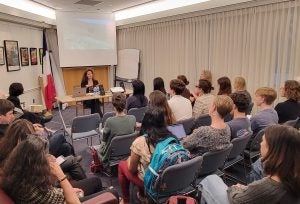 By Marium Houraney
By Marium Houraney
Filmmaker, journalist, writer, and 2012 MAAS alumna Dorothée Myriam Kellou was recently awarded the prestigious Recanati-Kaplan Prize, an initiative supporting outstanding cultural projects from cultural actors in the Arab world. This honor highlights Kellou’s impressive career as well as her dedication to investigating the silenced histories of Algeria and France through a post-colonial lens. Her work focuses on uncovering forgotten traumas of colonization and forced displacement, especially as it pertains to her own family’s history, deeply intertwined with Algeria’s War of Independence.
Prior to MAAS, she studied international relations and Arab studies at Sciences-Po Lyon. Her research as an MAAS student led her to confront the colonial history of France in Algeria, and it was during this time that she began to explore the traumas her father had experienced but never spoken about. In 2019, Kellou released her debut documentary, In Mansourah, You Separated Us, which chronicles her father’s return to his Algerian village, Mansourah, after decades of exile. The film explores the forced resettlements that occurred during the Algerian War of Independence, during which millions of rural Algerians were displaced by the French military. Her documentary, which has been praised for its intimate portrayal of memory, trauma, and reconciliation, played in numerous international film festivals and received several awards, including the Human Rights Award at Fidadoc and the Étoile de la Scam in 2021.

In addition to her film work, Kellou has made significant contributions to investigative journalism. In 2016, she uncovered the Lafarge scandal for the French newspaper Le Monde, revealing that the French cement company had indirectly funded the Islamic State (IS) group during the Syrian war. This investigation earned her the TRACE International Prize for Investigative Reporting.
Kellou is also the co-founder and current president of Rawiyat, a collective of female filmmakers from the Middle East and North Africa, which was established in 2020. Rawiyat provides crucial support and solidarity to women filmmakers in the region, offering mentoring, networking opportunities, and resources to help them navigate the challenges of filmmaking. Through this initiative, Kellou has collaborated with other female filmmakers in an effort to uplift emerging voices in MENA cinema.
In 2023, she published her first book, Nancy-Kabylie, an intimate exploration of her dual French-Algerian identity and the long-lasting impacts of colonialism on her family and homeland. Blending personal narrative with historical investigation, Kellou’s book delves into the silences surrounding France’s colonization of Algeria and the postcolonial wounds that continue to affect both nations.
Through her films, journalism, and writing, Kellou continues to explore the hidden stories of Algeria, illuminating the complex legacies of colonization and exile. Kellou’s journey is rooted in her personal and intellectual desire to understand her own Algerian heritage. Her father, an exiled Algerian filmmaker, was hesitant to talk about his past, prompting Kellou to delve into her family’s roots through her academic and professional pursuits. Her father, Kellou says, would have never anticipated making a movie at 79 years old about revisiting this past, but making a space for him to revisit his childhood in Algeria led to an intergenerational collaboration that allowed them to produce an in-depth understanding of a colonial past that she argues has too often been told by former colonial powers. Her father’s generation, she says, went through a lot during the Algerian War of Independence, making them more closed-off and unwilling to talk about themselves or their experience. Her generation of Algerians in the diaspora, as a result, had to investigate their family history to learn about their heritage and navigate post-colonial themes and colonial histories. Looking forward, Kellou believes that the younger generation of Algerians and, more broadly, those descended from peoples who have been formerly colonized, are “not afraid to talk in 1st person and tackle hard topics.” Kellou hopes her post-colonial work will reach this generation and encourage them to investigate colonial histories and to contribute to scholarship that tells history from this perspective.
Marium Houraney is a second-year student in the MAAS program.